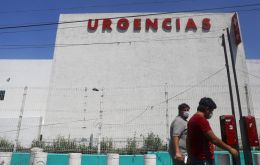MercoPress. South Atlantic News Agency
Latin America
-
Wednesday, August 12th 2020 - 08:46 UTC
Mexican masked wrestlers out of business or forced to underground fights by the Covid-19 virus

Mexico’s legendary masked wrestlers have been economically body-slammed by the coronavirus pandemic, with some resorting to food parcels or even underground fights to survive a ban on sporting events.
-
Wednesday, August 12th 2020 - 08:42 UTC
Obesity and diabetes plagued Mexico confronts world's biggest food companies

The United States, European Union, Canada, and Switzerland, home to some of the world's biggest food companies, have pressed Mexico to delay upcoming health warnings on processed food and drinks, a World Trade Organization document showed.
-
Tuesday, August 11th 2020 - 08:03 UTC
Bolivia's military and police called on political leaders to dialogue and lift blockades

Bolivia's top military and police chiefs on Monday called on political leaders to hold a dialogue to ease tensions and lift a week-long blockade over postponed elections.
-
Monday, August 10th 2020 - 07:57 UTC
Some 340 Chinese vessels fishing off Galapagos Islands protected waters

Ecuador's navy is conducting surveillance of a massive Chinese fishing fleet that is operating near the protected waters of the Galapagos Islands, amid concerns about the environmental impact of fishing in the area of the ecologically sensitive islands.
-
Saturday, August 8th 2020 - 08:30 UTC
Latin America becomes the region hardest-hit by coronavirus deaths

Latin America and the Caribbean surpassed Europe on Friday to become the region hardest-hit by coronavirus deaths, as India passed the somber step of recording over two million infections. The world's worst-hit region had reported 213,120 fatalities, 460 more than Europe, according to a tally based on official data.
-
Thursday, August 6th 2020 - 09:30 UTC
The Americas suffering disruptions in regular health services caused by Covid-19

Health services are being disrupted in countries of the Americas as health workers are redirected to care for COVID-19 patients, people hesitate to seek routine care due to fears of infection, and global supply chains of medicines and equipment are strained said Carissa F. Etienne, Director of the Pan American Health Organization (PAHO)
-
Monday, August 3rd 2020 - 10:59 UTC
Coronavirus death toll in Latin America at over 200,000

The death toll in Latin America from the novel coronavirus passed 200,000 on Saturday night underlining the region's status as one of the global epicenters of the pandemic that is testing governments to the limit.
-
Monday, August 3rd 2020 - 10:58 UTC
LATAM to lay off another 2,700 crew after failing an agreement with the union

Latin America's biggest airline, the Brazilian-Chilean group LATAM, said it was laying off at least 2,700 crew to cope with the devastating effects of the coronavirus pandemic on the aviation industry.
-
Monday, August 3rd 2020 - 10:53 UTC
Mexico becomes the country with the third most Covid-19 deaths, ahead of Britain

Mexico has overtaken Britain to become the country with the third-most deaths due to Covid-19, according to data released by the Health Ministry. Reported fatalities rose to reach 46,688, the data shows.
-
Monday, August 3rd 2020 - 09:47 UTC
Mexican journalist and bodyguard murdered in Mexico, fifth so far this year

A Mexican journalist and his police bodyguard were murdered in a hail of gunfire in the southern state of Guerrero early on Sunday, police and human rights officials said. Pablo Morrugares is the fourth journalist murdered in Mexico in 2020.
